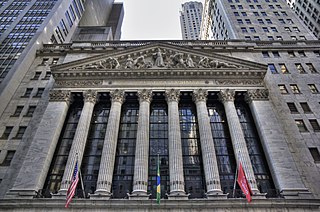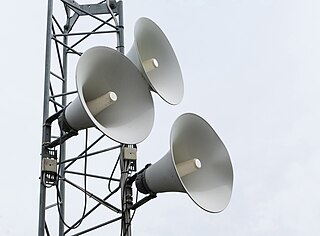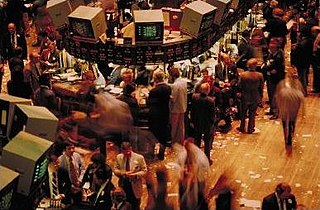Related Research Articles

A stock exchange, securities exchange, or bourse is an exchange where stockbrokers and traders can buy and sell securities, such as shares of stock, bonds and other financial instruments. Stock exchanges may also provide facilities for the issue and redemption of such securities and instruments and capital events including the payment of income and dividends. Securities traded on a stock exchange include stock issued by listed companies, unit trusts, derivatives, pooled investment products and bonds. Stock exchanges often function as "continuous auction" markets with buyers and sellers consummating transactions via open outcry at a central location such as the floor of the exchange or by using an electronic system to process financial transactions.
The Session Initiation Protocol (SIP) is a signaling protocol used for initiating, maintaining, and terminating communication sessions that include voice, video and messaging applications. SIP is used in Internet telephony, in private IP telephone systems, as well as mobile phone calling over LTE (VoLTE).

A telephone, colloquially referred to as a phone, is a telecommunications device that permits two or more users to conduct a conversation when they are too far apart to be easily heard directly. A telephone converts sound, typically and most efficiently the human voice, into electronic signals that are transmitted via cables and other communication channels to another telephone which reproduces the sound to the receiving user. The term is derived from Ancient Greek: τῆλε, romanized: tēle, lit. 'far' and φωνή, together meaning distant voice.
In telecommunications, a customer-premises equipment or customer-provided equipment (CPE) is any terminal and associated equipment located at a subscriber's premises and connected with a carrier's telecommunication circuit at the demarcation point ("demarc"). The demarc is a point established in a building or complex to separate customer equipment from the equipment located in either the distribution infrastructure or central office of the communications service provider.

A stock market, equity market, or share market is the aggregation of buyers and sellers of stocks, which represent ownership claims on businesses; these may include securities listed on a public stock exchange as well as stock that is only traded privately, such as shares of private companies that are sold to investors through equity crowdfunding platforms. Investments are usually made with an investment strategy in mind.
Voice over Internet Protocol (VoIP), also called IP telephony, is a method and group of technologies for voice calls for the delivery of voice communication sessions over Internet Protocol (IP) networks, such as the Internet.

A telephone call or telephone conversation, also known as a phone call or voice call, is a connection over a telephone network between the called party and the calling party. Telephone calls started in the late 19th century. As technology has improved, a majority of telephone calls are made over a cellular network through mobile phones or over the internet with Voice over IP. Telephone calls are typically used for real-time conversation between two or more parties, especially when the parties cannot meet in person.

The Bloomberg Terminal is a computer software system provided by the financial data vendor Bloomberg L.P. that enables professionals in the financial service sector and other industries to access Bloomberg Professional Services through which users can monitor and analyze real-time financial market data and place trades on the electronic trading platform. It was developed by employees working for businessman Michael Bloomberg. The system also provides news, price quotes, and messaging across its proprietary secure network. It is well known among the financial community for its black interface, which has become a recognizable trait of the service. The first version of the terminal was released in December 1982.

A public address system is an electronic system comprising microphones, amplifiers, loudspeakers, and related equipment. It increases the apparent volume (loudness) of a human voice, musical instrument, or other acoustic sound source or recorded sound or music. PA systems are used in any public venue that requires that an announcer, performer, etc. be sufficiently audible at a distance or over a large area. Typical applications include sports stadiums, public transportation vehicles and facilities, and live or recorded music venues and events. A PA system may include multiple microphones or other sound sources, a mixing console to combine and modify multiple sources, and multiple amplifiers and loudspeakers for louder volume or wider distribution.

A business telephone system is a telephone system typically used in business environments, encompassing the range of technology from the key telephone system (KTS) to the private branch exchange (PBX).
An electronic communication network (ECN) is a type of computerized forum or network that facilitates the trading of financial products outside traditional stock exchanges. An ECN is generally an electronic system that widely disseminates orders entered by market makers to third parties and permits the orders to be executed against in whole or in part. The primary products that are traded on ECNs are stocks and currencies. ECNs are generally passive computer-driven networks that internally match limit orders and charge a very small per share transaction fee.
Secure communication is when two entities are communicating and do not want a third party to listen in. For this to be the case, the entities need to communicate in a way that is unsusceptible to eavesdropping or interception. Secure communication includes means by which people can share information with varying degrees of certainty that third parties cannot intercept what is said. Other than spoken face-to-face communication with no possible eavesdropper, it is probable that no communication is guaranteed to be secure in this sense, although practical obstacles such as legislation, resources, technical issues, and the sheer volume of communication serve to limit surveillance.

Open outcry is a method of communication between professionals on a stock exchange or futures exchange, typically on a trading floor. It involves shouting and the use of hand signals to transfer information primarily about buy and sell orders. The part of the trading floor where this takes place is called a pit.
A trading curb is a financial regulatory instrument that is in place to prevent stock market crashes from occurring, and is implemented by the relevant stock exchange organization. Since their inception, circuit breakers have been modified to prevent both speculative gains and dramatic losses within a small time frame. When triggered, circuit breakers either stop trading for a small amount of time or close trading early in order to allow accurate information to flow among market makers and for institutional traders to assess their positions and make rational decisions.
The Kazakhstan Stock Exchange is a stock exchange located in Almaty, Kazakhstan. The exchange was founded in 1993.
The Consolidated Tape Association (CTA) oversees the Securities Information Processor that disseminates real-time trade and quote information in New York Stock Exchange (NYSE) and American Stock Exchange (AMEX) listed securities. It is currently chaired by Emily Kasparov of the Chicago Stock Exchange, the first woman and the youngest chair elected to the position.

In finance, an electronic trading platform also known as an online trading platform, is a computer software program that can be used to place orders for financial products over a network with a financial intermediary. Various financial products can be traded by the trading platform, over a communication network with a financial intermediary or directly between the participants or members of the trading platform. This includes products such as stocks, bonds, currencies, commodities, derivatives and others, with a financial intermediary such as brokers, market makers, Investment banks or stock exchanges. Such platforms allow electronic trading to be carried out by users from any location and are in contrast to traditional floor trading using open outcry and telephone-based trading. Sometimes the term trading platform is also used in reference to the trading software alone.
A trading turret or dealer board is a specialized telephony key system that is generally used by financial traders on their trading desks. Trading has progressed from floor trading through phone trading to electronic trading during the later half of the twentieth century with phone trading having dominated during the 1980s and 1990s. Although most trading volume is now done via electronic trading platforms, some phone trading persists and trading turrets are common on trading desks of investment banks.
IPC Systems, Inc. is an American company headquartered in Jersey City, New Jersey that provides and services voice communication systems for financial companies. In 2014, IPC Systems employs approximately 1,000 employees throughout the Americas, EMEA and Asia-Pacific regions

Interactive Brokers, Inc. (IB), headquartered in Greenwich, Connecticut, is an American multinational brokerage firm. It operates the largest electronic trading platform in the United States by number of daily average revenue trades - in 2023, it processed an average of 3 million trades per trading day. The company brokers stocks, options, futures contracts, EFPs, futures options, forex, bonds, mutual funds, and cryptocurrency. It offers omnibus and non-disclosed broker accounts and provides clearing services to 200 introducing brokers worldwide. It has operations in 34 countries and 27 currencies and has 2.6 million institutional and individual brokerage customers, with total customer equity of $426 billion as of December 31, 2023.
References
- ↑ Coleman, Lynn (2011). Managing Records in Global Financial Markets: Ensuring Compliance and Mitigating Risk. Facet Publishing. p. 10. ISBN 9781856046633.
- ↑ Smith, Charles (2007). Creating a Trading Floor: The Project Manager's Guide to the Design, Construction and Launch of Trading Floors and Data Centres . Kogan Page Publishers. p. 290. ISBN 9780749450410.
- ↑ International Organization of Securities Commissions (1996). Report on the International Regulation of Derivative Markets, Products and Financial Intermediaries. IOSCO. p. 557.